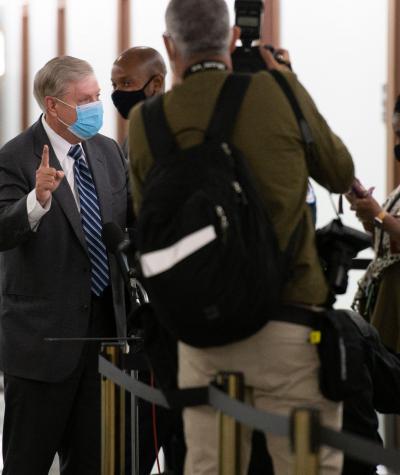The U.S. Senate’s decision not to hold former President Trump accountable for his role in the Jan. 6 attack on the Capitol, despite bipartisan agreement that he incited rioters, highlights a larger problem in the upper chamber.
The Senate seems to have an aversion to accountability not only for the immediate past president but also for its own members. The Senate Ethics Committee, which is the only formal body created to discipline senators for misconduct, demonstrates the clear culture of ignoring misconduct.
To avoid more damage to public trust, the Senate needs an independent ethics enforcement body.
Campaign Legal Center’s (CLC) comparative study of ethics enforcement in the Senate and House of Representatives finds that the Senate is remarkably less transparent and does not hold officials accountable.
During the past ten years, the Senate Ethics Committee dismissed investigated complaints at a rate of 52%, and only 3% of those investigated complaints resulted in the finding of a violation. And there is no way to explain what happens with the other cases because there are few public reports.
On the other hand, the Office of Congressional Ethics (OCE) dismisses complaints at a rate of 56% but finds violations in 41% of cases. More importantly, 43% of the investigations result in public reports compared to 5% in the Senate.
These ethics issues are more than statistics. The matters involve high-profile and serious allegations of misconduct. A snapshot of the growing ethics problems in the Senate begins with congressional stock trading during the early months of the COVID-19 pandemic in 2020.
Four senators allegedly put their own finances ahead of public trust and used their access to confidential information to purchase and sell stock. A flurry of complaints were filed surrounding possible insider trading, but inaction by the Senate Ethics Committee followed.
A few months later, two senators solicited campaign contributions from Senate office buildings on live television, blatantly violating the criminal prohibition of fundraising in federal buildings. Again, the Senate Ethics Committee did not respond. Overall, the ethics committee received 144 allegations in 2020.
Then, on Jan. 21, 2021, seven Democratic senators asked for an investigation of two Republican Senators for their role in questioning the democratic outcome of the 2020 presidential election, which may have contributed to the violent siege of the Capitol on Jan. 6.
In response, one of the accused senators filed a countercomplaint, asking that the ethics committee review whether the original complaint was frivolous or aided by outside groups.
Although it remains unclear what will become of these complaints, they are likely to disappear into the abyss because unlike the House, the Senate does not have an independent investigatory body for ethics complaints.
The Senate Ethics Committee, while bipartisan, is still operated by the colleagues of those against whom complaints are filed. When ethics complaints are filed in the Senate, there is almost no transparency surrounding those complaints.
The Senate does not publicize any detailed record of the complaints they receive and whether the complaints were resolved. The public is forced to rely on media reporting to know when Senators are accused of ethics violations.
On the other hand, the House has an independent ethics investigatory body, the OCE, that is responsible for receiving and investigating ethics complaints. Upon completion of its investigation, the OCE refers the findings to the House Ethics Committee to ultimately resolve the complaint.
In 2006, an amendment that would’ve created an independent body to conduct an investigation similar to the OCE for the Senate was killed thanks in part to misleading representations of the Senate Ethics Committee’s response to complaints.
The chairman of the committee at the time said, “The truth is, the Senate Ethics Committee operates effectively and in a bipartisan fashion.”
Public confidence in the integrity of democratic institutions is one of the hallmarks of a healthy democracy. Federal, state, and local governments have a responsibility to enact and enforce clear ethical guidelines and laws.
Public confidence is earned through the commitment of those in and working with the government to uphold the principle that public service is a public trust.
For more than a decade, the facts have shown us that the time is now for Senators to commit to a plan for an accountable and transparent government. This includes providing a meaningful avenue to pursue ethics enforcement in the Senate.
The Senate should follow the model of the House and create an independent ethics enforcement body and give that body real teeth to do its job: holding elected officials accountable to the public.

